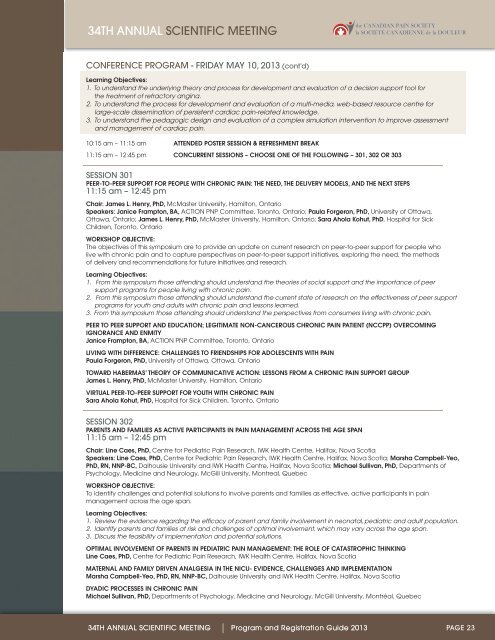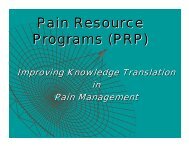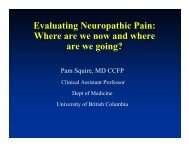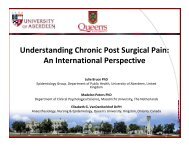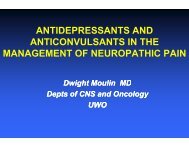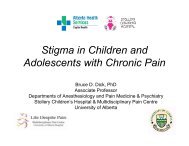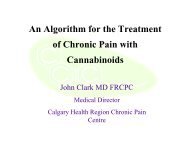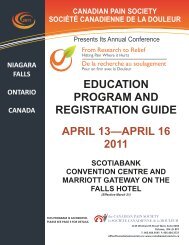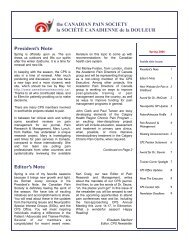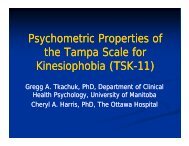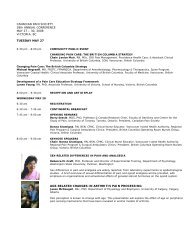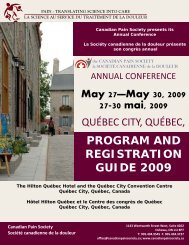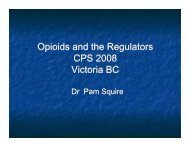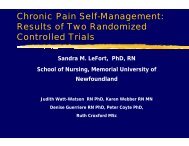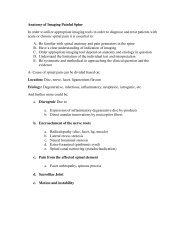Registration & Program Guide - The Canadian Pain Society
Registration & Program Guide - The Canadian Pain Society
Registration & Program Guide - The Canadian Pain Society
Create successful ePaper yourself
Turn your PDF publications into a flip-book with our unique Google optimized e-Paper software.
34TH ANNUAL SCIENTIFIC MEETING<br />
CONFERENCE PROGRAM - FRIDAY MAY 10, 2013 (cont’d)<br />
Learning Objectives:<br />
1. To understand the underlying theory and process for development and evaluation of a decision support tool for<br />
the treatment of refractory angina.<br />
2. To understand the process for development and evaluation of a multi-media, web-based resource centre for<br />
large-scale dissemination of persistent cardiac pain-related knowledge.<br />
3. To understand the pedagogic design and evaluation of a complex simulation intervention to improve assessment<br />
and management of cardiac pain.<br />
10:15 am – 11:15 am ATTENDED POSTER SESSION & REFRESHMENT BREAK<br />
11:15 am – 12:45 pm CONCURRENT SESSIONS – CHOOSE ONE OF THE FOLLOWING – 301, 302 OR 303<br />
SESSION 301<br />
PEER-TO-PEER SUPPORT FOR PEOPLE WITH CHRONIC PAIN: THE NEED, THE DELIVERY MODELS, AND THE NEXT STEPS<br />
11:15 am – 12:45 pm<br />
Chair: James L. Henry, PhD, McMaster University, Hamilton, Ontario<br />
Speakers: Janice Frampton, BA, ACTION PNP Committee, Toronto, Ontario; Paula Forgeron, PhD, University of Ottawa,<br />
Ottawa, Ontario; James L. Henry, PhD, McMaster University, Hamilton, Ontario; Sara Ahola Kohut, PhD, Hospital for Sick<br />
Children, Toronto, Ontario<br />
WORKSHOP OBJECTIVE:<br />
<strong>The</strong> objectives of this symposium are to provide an update on current research on peer-to-peer support for people who<br />
live with chronic pain and to capture perspectives on peer-to-peer support initiatives, exploring the need, the methods<br />
of delivery and recommendations for future initiatives and research.<br />
Learning Objectives:<br />
1. From this symposium those attending should understand the theories of social support and the importance of peer<br />
support programs for people living with chronic pain.<br />
2. From this symposium those attending should understand the current state of research on the effectiveness of peer support<br />
programs for youth and adults with chronic pain and lessons learned.<br />
3. From this symposium those attending should understand the perspectives from consumers living with chronic pain.<br />
PEER TO PEER SUPPORT AND EDUCATION; LEGITIMATE NON-CANCEROUS CHRONIC PAIN PATIENT (NCCPP) OVERCOMING<br />
IGNORANCE AND ENMITY<br />
Janice Frampton, BA, ACTION PNP Committee, Toronto, Ontario<br />
LIVING WITH DIFFERENCE: CHALLENGES TO FRIENDSHIPS FOR ADOLESCENTS WITH PAIN<br />
Paula Forgeron, PhD, University of Ottawa, Ottawa, Ontario<br />
TOWARD HABERMAS’ THEORY OF COMMUNICATIVE ACTION: LESSONS FROM A CHRONIC PAIN SUPPORT GROUP<br />
James L. Henry, PhD, McMaster University, Hamilton, Ontario<br />
VIRTUAL PEER-TO-PEER SUPPORT FOR YOUTH WITH CHRONIC PAIN<br />
Sara Ahola Kohut, PhD, Hospital for Sick Children, Toronto, Ontario<br />
SESSION 302<br />
PARENTS AND FAMILIES AS ACTIVE PARTICIPANTS IN PAIN MANAGEMENT ACROSS THE AGE SPAN<br />
11:15 am – 12:45 pm<br />
Chair: Line Caes, PhD, Centre for Pediatric <strong>Pain</strong> Research, IWK Health Centre, Halifax, Nova Scotia<br />
Speakers: Line Caes, PhD, Centre for Pediatric <strong>Pain</strong> Research, IWK Health Centre, Halifax, Nova Scotia; Marsha Campbell-Yeo,<br />
PhD, RN, NNP-BC, Dalhousie University and IWK Health Centre, Halifax, Nova Scotia; Michael Sullivan, PhD, Departments of<br />
Psychology, Medicine and Neurology, McGill University, Montreal, Quebec<br />
WORKSHOP OBJECTIVE:<br />
To identify challenges and potential solutions to involve parents and families as effective, active participants in pain<br />
management across the age span.<br />
Learning Objectives:<br />
1. Review the evidence regarding the efficacy of parent and family involvement in neonatal, pediatric and adult population.<br />
2. Identify parents and families at risk and challenges of optimal involvement, which may vary across the age span.<br />
3. Discuss the feasibility of implementation and potential solutions.<br />
OPTIMAL INVOLVEMENT OF PARENTS IN PEDIATRIC PAIN MANAGEMENT: THE ROLE OF CATASTROPHIC THINKING<br />
Line Caes, PhD, Centre for Pediatric <strong>Pain</strong> Research, IWK Health Centre, Halifax, Nova Scotia<br />
MATERNAL AND FAMILY DRIVEN ANALGESIA IN THE NICU- EVIDENCE, CHALLENGES AND IMPLEMENTATION<br />
Marsha Campbell-Yeo, PhD, RN, NNP-BC, Dalhousie University and IWK Health Centre, Halifax, Nova Scotia<br />
DYADIC PROCESSES IN CHRONIC PAIN<br />
Michael Sullivan, PhD, Departments of Psychology, Medicine and Neurology, McGill University, Montréal, Quebec<br />
34TH ANNUAL SCIENTIFIC MEETING <strong>Program</strong> and <strong>Registration</strong> <strong>Guide</strong> 2013 PAGE 23


